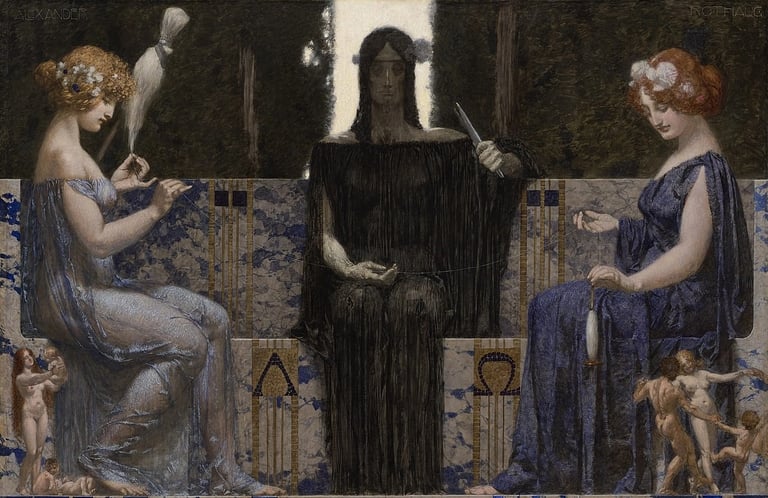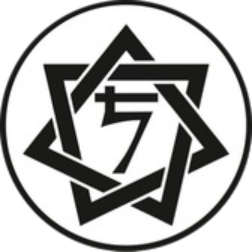FOLLOWING THE THREADS OF FATE
About modern esotericism and the causes of diseases from the point of view of astrology.


Following the Threads of Fate
From time to time, we encounter a certain type of person who, having skimmed a bit of esoteric literature, begins to lecture others on pondering causes and consequences. Or so they believe. Typically, these individuals are hardly distinguished by great intellect or insight, which fosters in them the illusion of possessing profound knowledge. This is a rather common phenomenon, particularly among enthusiasts of literature — if we can call it that — in the vein of Robin Sharma, Drunvalo Melchizedek, and their ilk. Barely grasping the tip of the tail of sacred knowledge, distorted beyond recognition by populist writers, they spout tiresomely familiar phrases, often lacking even variety in their wording: “Think about the reasons”; “Reflect on this”; “Why did this happen?”; “If it happened, you must be doing something wrong”; “It’s karma”; and so on, from the dictionary of the novice neo-esoteric. They remind us somewhat of Huey, Dewey, and Louie from Walt Disney’s DuckTales, with their Junior Woodchuck Guidebook. In their universe, everything is simple — just open the right page and read the ready-made answer. Earache? You don’t want to hear! Poor eyesight? You don’t want to see! Stomach troubles? You’re not digesting information properly! And so it goes, in this half-esoteric, half-comical vein. It never occurs to them that there could be as many causes as there are people in the world. Not to mention that the same illnesses can stem from vastly different reasons, as ancient medicine clearly articulated thousands of years ago when addressing the humoral balance in the human body on a physical level. But that requires study, not mere reading. While the ancients believed that attaining truth through direct experience was an immensely challenging task, our contemporaries, freshly hatched from their esoteric eggs, assume it’s far simpler. Read, hear, repeat — like a parrot. Why experience truth directly when you can just talk about it, without bothering to discern where truth ends and falsehood begins, where half-truths blur into distortions? Much like certain astrology enthusiasts, bypassed by practice and mastery, who churn out tonnes of utter nonsense online or prattle on about what transits, corridors, mirrors, special numbers for beginnings, and other so-called innovative forecasting techniques mean. Oddly, they don’t throw in cake recipes. If you’re going to clutter your mind with rubbish, you might as well go all in.
We, of course, adore listening to such nonsense, especially when it’s delivered with supreme confidence and even faith in one’s own folly — sometimes you just have to let a fool speak to feel clever for a moment. But at times, we grow weary of it, and the part of us that loves asking inconvenient questions awakens, dousing the fervour of their ventriloquism. When we point out that truth must be lived, not merely read about somewhere or from someone, they take offence. Yet, as we explain, the same applies to astrology. We cannot call ourselves astrologers until we’ve tested theory in practice. Practice creates knowledge; theory is merely a stepping stone, nothing more. In this sense, the law is universal — be it astrology, esotericism, or yoga. In any sphere of life, really. No experience, no knowledge. And practical experience at that.
These trite “truths” about every illness having a single internal cause, suggesting something was done wrong, truly make one wonder whether common sense has been utterly lost among neo-esoterics. They remind us of the spiritualists of the late 19th century, who believed only in spirits and explained all phenomena, indeed life itself, through them, without distinguishing between elementals and elementaries, discarded shells and immortal souls, concentrated thoughts and the actions of an etheric double via ectoplasm. Everything was attributed to external spirits. Likewise, our modern esoterics find one, at most two, explanations for everything. And it’s awfully convenient.
Here, we’d like to pose an uncomfortable question about fate. What about it? What do we do when some, particularly serious, illnesses are inscribed in one’s birth chart, though they may manifest only years later? How should we frame the question then? Someone becomes disabled after an injury, and we see it was foretold in their birth chart — what do we do? Ask them, right after the injury, “What did you do wrong, mate?” After all, those fond of such questions often assume everything stems from this life. But if there’s a birth chart, it’s nothing less than a map of a person’s fate — created or laid down in the past. What then? Sit in meditation or read the “karmic” aspects of a horoscope, which don’t even exist? Because, in the language of our esoteric brethren, the horoscope is karma. The horoscope reflects a person’s fate. How can we ensure the answer about the cause is correct? You caused suffering in the past, so now you suffer. Are you certain? Is suffering the only cause of suffering? Are there no other reasons at all? Like compassion or love for someone?
All we can definitively say about the causes of illnesses is the most superficial, nothing more. I forgot to dress warmly in cold weather, got caught in the rain, and caught a cold. A perfectly obvious cause, with no need to seek some deeper meaning. But there are indeed subtler causes, tied more to breaches of moral laws, if we may call them that. It’s clear that anger can literally destroy a person’s nervous system, which largely maintains the body’s health balance, and trigger various illnesses. Not just a fever or a cold. Much depends not only on the dominant humour, or temperament, in a person’s body but also on the overall humoral balance. For instance, a runny nose might be caused by a cold or an allergy — an excess of phlegm or fire in the body, driven by different humours. Or consider a more serious condition like dementia or senile cognitive decline. Diseases of the mind, with many manifestations and medical names, stem from varied causes. These are linked to cognitive impairments, yet they too can be driven by different humours. In one case, an excess of melancholy might disrupt neural connections, causing them to wither and break. In another, an excess of phlegm might blur all boundaries, rendering everything formless. If we delve further into subtler, non-physical causes tied to melancholy or phlegm, we again find not a single cause but a multitude, each unique to the individual. Now imagine we overlook this and attribute the illness to something else, as many healing books do. Sometimes they’re right, but more often, they’re not. What then? Might we cause greater harm with misplaced advice, especially if someone heeds it and focuses on the wrong cause? What would the consequences be?
Finally, the most complex causes of illnesses are those directly tied to a person’s fate. These are the chronic conditions we see in a birth chart. All we can say is they stem from the past — but how? We don’t know. Only a teacher for whom the past, present, and future are an open book could say. Do you know how many such people exist? We reckon barely a dozen or two among the eight billion on our planet. And we’re unlikely to read their books… at least not in this era.
Such is the inconvenient truth of astrology, which can do a great deal — identify types of illnesses, highlight contributing factors, offer lifestyle or dietary advice, and more. Yet, when it comes to the subtler causes of diseases, we enter the realm of probabilities rather than certainties. It’s no coincidence that medical matters fall under the sixth house in natal astrology — the house not aspected by the Ascendant, beyond our control. We cannot control it in our lives. The exception is horary questions, where a querent might ask whether their gluttony or a recent heartbreak caused their illness. Yet, in over twelve years of practice, we’ve never encountered such questions. The exceptions were, once again, not questions but musings from acquaintances steeped in pop-esotericism, with their unsolicited advice: “Think about what you did wrong.” Perhaps they should reflect on whether the cause of illness always lies within the person. Might it not stem from their impenetrable folly? Maybe, before advising others, they should first sort themselves out and gain at least a basic, elementary understanding of the fundamentals.
And yet, in trying to unravel the complex threads of fate through the simplistic formulas of pop-esotericism, we risk becoming even more entangled. A superficial approach to sacred knowledge is fraught with dire consequences. We might mistake the flickering lights of pop-esotericism for salvation and drown in a quagmire of delusions and lies. Practical experience and common sense are essential to stand firm when the winds of New Age esotericism try to knock us off the path of true knowledge. Only then can we see life’s events and their causes without distortion. Where clarity eludes us, we’d do better to choose silence over empty conjectures. For sometimes, silence is indeed the only honest answer. At least to ourselves.
Subscribe to our blog



